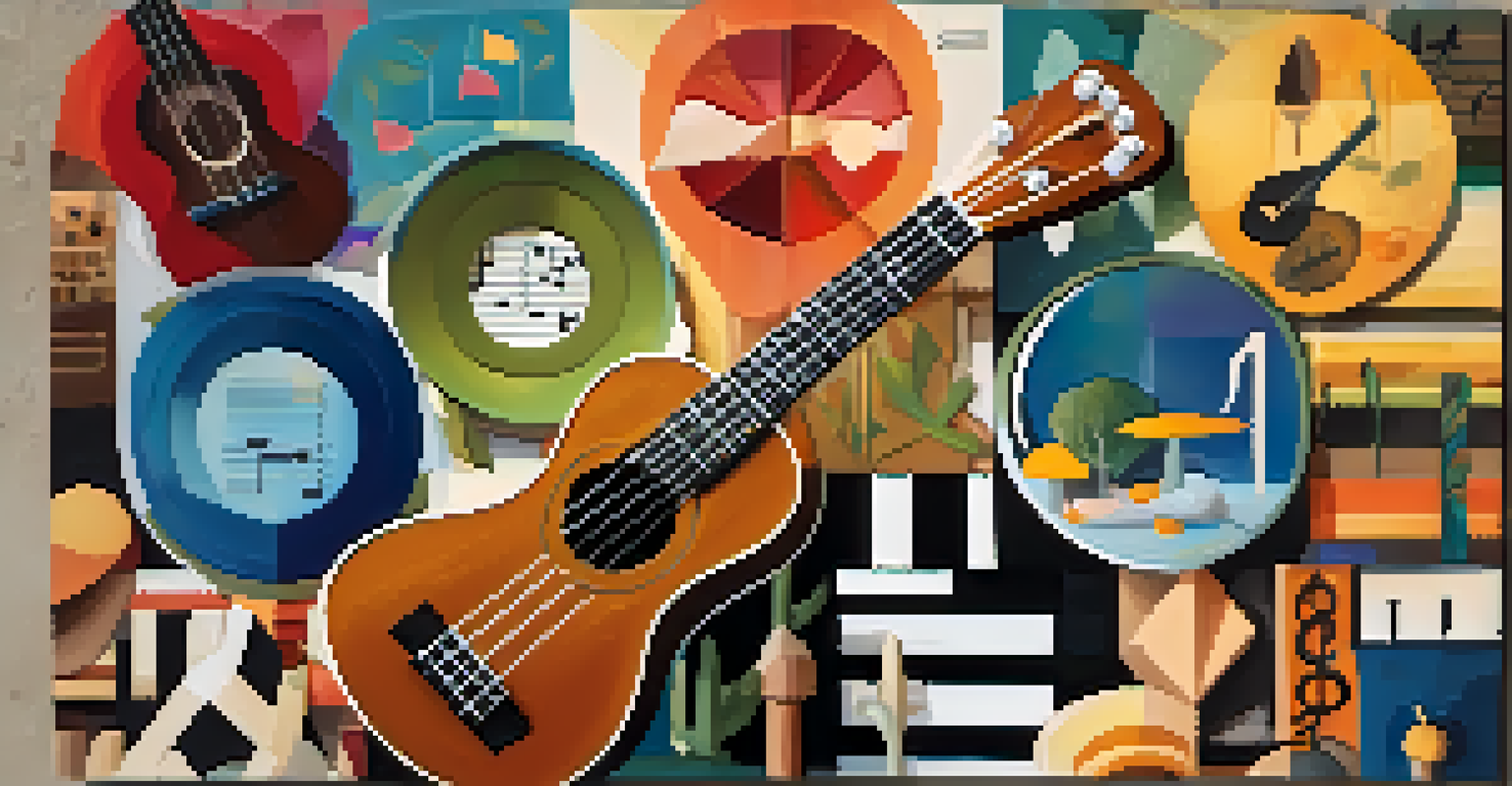The Ukulele's Evolution: From Traditional to Modern Music Genres

The Humble Origins of the Ukulele in Hawaii
The ukulele, a small four-stringed instrument, has its roots in Hawaii, where it was introduced in the 19th century. It evolved from similar instruments brought by Portuguese immigrants, particularly the braguinha. This cheerful instrument quickly became a symbol of Hawaiian culture, embraced for its light, melodic sound that complemented the islands' natural beauty.
The ukulele is a wonderful instrument, and it’s fun to play. It’s easy to learn, and it’s a great way to make music with friends.
In the early days, the ukulele was often played during casual gatherings and festive occasions, becoming a favorite among locals and tourists alike. It was a perfect instrument for beachside sing-alongs, as its portability made it easy to carry around. The joyful strumming of the ukulele became synonymous with Hawaiian hospitality.
Over time, the ukulele's charm transcended geographic boundaries, capturing the hearts of musicians far beyond Hawaii. Its simple structure and relatively easy learning curve made it accessible to everyone, from children to seasoned musicians. This laid the groundwork for the ukulele's evolution into a versatile instrument in various music genres.
The Ukulele's Rise in Popularity in the 20th Century
The early 20th century marked a significant turning point for the ukulele, especially with the advent of radio and recording technologies. Artists like Roy Smeck, known as 'The Wizard of the Strings', showcased the ukulele's potential on national platforms, sparking widespread interest. This newfound visibility helped the instrument gain a reputation that was both playful and sophisticated.

During the 1920s, the ukulele became a staple in American popular music, often featured in jazz and vaudeville performances. Its upbeat sound made it a natural fit for the lively tunes of the Roaring Twenties. The ukulele captured the essence of the era, symbolizing freedom and joy, and became a beloved instrument in households across the nation.
Ukulele's Hawaiian Roots and Culture
The ukulele, introduced in 19th century Hawaii, quickly became a symbol of the islands' culture with its cheerful sound and portability.
As the decades passed, the ukulele continued to evolve, adapting to the changing musical landscape. Iconic figures like Tiny Tim brought the instrument into mainstream consciousness during the 1960s, while surf rock bands incorporated it into their sound. This adaptability has allowed the ukulele to remain relevant and loved through the years.
The Ukulele in the World of Folk Music
The folk music revival of the 1960s offered a fresh canvas for the ukulele, which found its place alongside guitars and banjos. Artists like Pete Seeger and later, the likes of Ben Harper, showcased the ukulele’s unique sound in storytelling and protest songs. Its simplicity allowed for heartfelt expressions that resonated with audiences seeking authenticity.
Music is the universal language of mankind. The ukulele helps bridge the gap between cultures through its joyful sound.
In folk music, the ukulele serves as both a lead and accompanying instrument, often highlighting the vocal harmonies that are central to the genre. Its cheerful tone contrasts beautifully with poignant lyrics, adding layers of emotion to the music. This versatility has cemented the ukulele's role in folk circles, making it a favorite among singer-songwriters.
Moreover, the accessibility of the ukulele has encouraged many to join the folk music movement. With just a few chords, beginners can participate in jam sessions, fostering a sense of community. This grassroots appeal reinforces the ukulele's standing as a beloved instrument in folk traditions worldwide.
The Ukulele's Role in Pop Music Today
In recent years, the ukulele has made a significant impact on the pop music scene, with artists like Jason Mraz and Ed Sheeran incorporating it into their hits. Its bright, upbeat sound adds a playful character to modern pop songs, helping them resonate with a wide audience. The instrument's unique charm allows musicians to create catchy melodies that stick in listeners' minds.
The rise of social media platforms like TikTok has also contributed to the ukulele's resurgence in pop music. Short videos featuring the instrument have gone viral, inspiring countless new players to pick it up. This trend demonstrates how the ukulele has not only remained relevant but has also adapted to contemporary music consumption habits.
The Ukulele's Versatility in Music
Over the decades, the ukulele has adapted to various genres, from jazz to pop, showcasing its unique charm and appeal across diverse musical landscapes.
Additionally, collaborations between ukulele players and pop artists are becoming increasingly common, blending genres in exciting ways. This fusion of styles showcases the ukulele's versatility, proving that it can hold its own among more traditional pop instruments. As a result, the ukulele continues to evolve, bridging the gap between genres and appealing to diverse audiences.
The Ukulele in Indie and Alternative Music
The indie and alternative music scenes have embraced the ukulele for its unique sound and the authenticity it brings to performances. Artists like Regina Spektor and Vance Joy have showcased the instrument in their music, often using it to create a whimsical or introspective atmosphere. The ukulele's ability to convey emotions resonates with indie music's ethos of genuine expression.
In these genres, the ukulele often serves as a centerpiece, allowing for experimentation with melodies and harmonies. Its soft tone can evoke a sense of nostalgia or whimsy, making it a perfect fit for storytelling. The instrument's charm has led to its incorporation in many indie anthems, capturing the hearts of listeners around the world.
Moreover, the ukulele's presence in live performances adds an element of surprise and joy. Musicians often use it as a tool for audience engagement, inviting sing-alongs that enhance the concert experience. This interactive quality contributes to the ukulele's popularity in the indie scene, where community and connection are paramount.
The Ukulele's Influence on Global Music Styles
As the ukulele travels the globe, it has influenced various music styles, from reggae to jazz. In places like Jamaica, the instrument has found its way into reggae music, adding a unique twist to traditional rhythms. This cultural exchange showcases the ukulele's adaptability and the ways it can enhance different musical genres.
In jazz, the ukulele has carved out its niche, with artists like Ukulele Ike (Cliff Edwards) paving the way for its acceptance. The instrument’s playful strumming complements the improvisational nature of jazz, allowing for creative musical conversations. Its inclusion in jazz ensembles highlights its versatility and ability to cross genre boundaries.
Community and Accessibility in Learning
The ukulele fosters a sense of community among musicians and learners, making it an accessible instrument that encourages collaboration and shared experiences.
Additionally, the ukulele's global presence has sparked interest in world music traditions, inspiring collaborations between musicians from different backgrounds. These cross-genre partnerships celebrate diversity and showcase the instrument's ability to bring people together through music. The ukulele's journey continues as it influences and is influenced by the rich tapestry of global sounds.
Learning and Playing the Ukulele: A Community Experience
One of the most beautiful aspects of the ukulele is its role in fostering community among musicians and learners. Whether in classrooms, community centers, or online forums, ukulele enthusiasts gather to share their passion for the instrument. This collaborative spirit creates an inclusive environment that encourages participation from all skill levels.
Various online resources and platforms have emerged, offering tutorials and song sheets to help beginners find their footing. The simplicity of the ukulele makes it an ideal starting point for those new to music. As individuals learn together, they create bonds and memories that enhance the overall experience of playing music.

Moreover, ukulele clubs and festivals have sprouted up worldwide, celebrating the instrument and its community. These gatherings provide opportunities for players to showcase their skills, learn from others, and enjoy the joy of music-making. The ukulele's evolution is not just about the music itself; it's also about the connections formed through shared experiences.